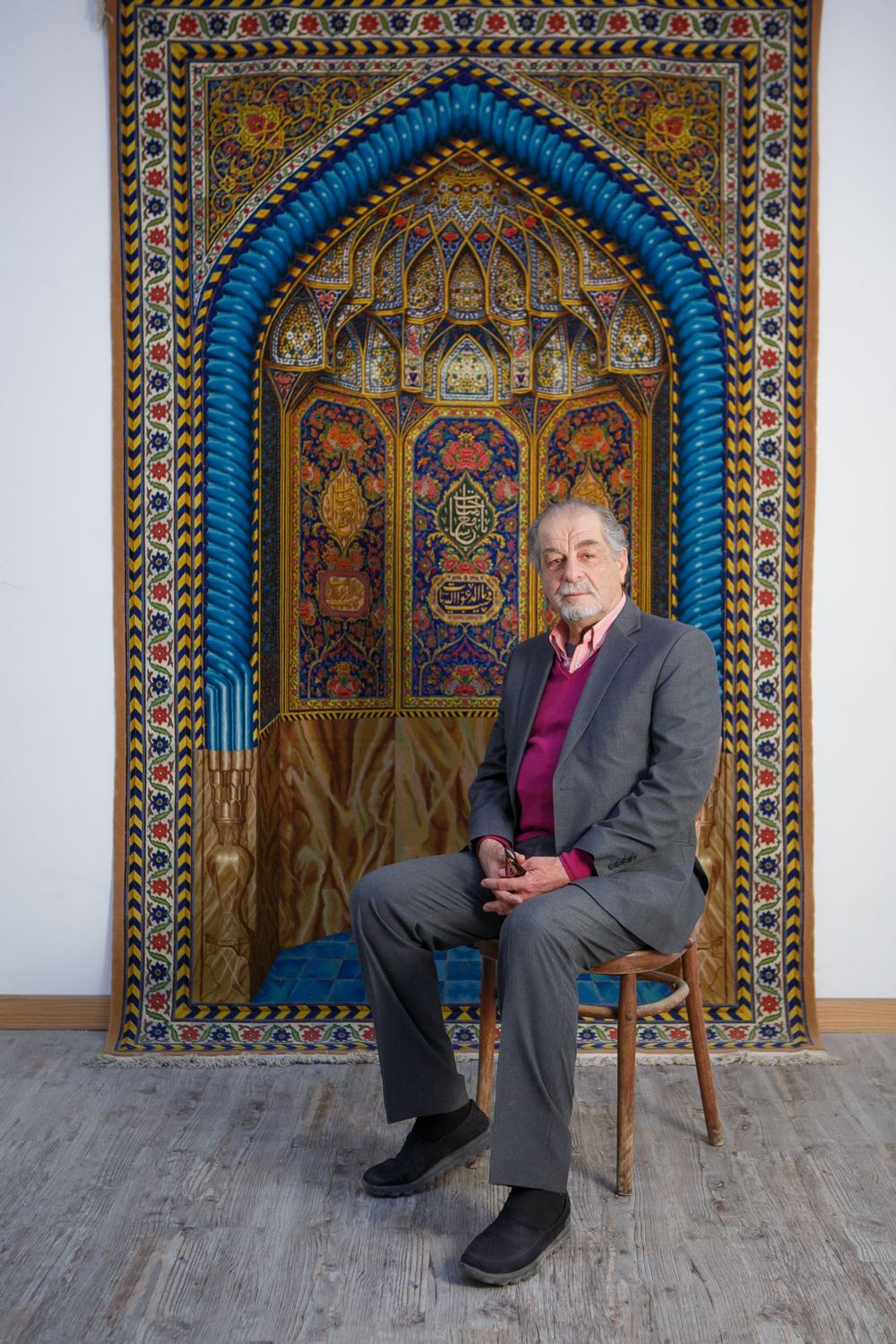Biography of Faizullah Khan Safdarzadeh Haghighi

1943: Biography of Feizollah Khan Safdarzadeh Haghighi
Feizollah Khan Safdarzadeh Haghighi, the son of Master Mehdi Khan, was born on March 16, 1943 in Esfahan in a family which the carpet weaving industry was inherited. Due to his great interest in painting and his father’s profession, he completed his education in Esfahan Fine Arts Conservatory under the supervision of masters such as Rostam Shirazi and Issa Bahadori – director and teacher of Fine Arts and carpet designer in the field of miniature.
Feizollah Khan’s studentship with master Rostam Shirazi, influenced his artistic style in the field of miniature and by using traditional and modern methods of painting he created new designs and had a great impact on Iranian carpet weaving art and industry.
1964: Training under the supervision of the Italian International Association
After graduating from the conservatory in 1964, Feizollah Khan was employed by the Isfahan Cultural Heritage Organization and he trained in the restoration of paintings on historical Monuments for six years, under the supervision of the Italian International Society for Middle East and Far East Studies (IsMEO), and from 1968 to 1971, Along with Italian delegations, he restored the murals of the Chehelston and Aali Qapo palaces.
1971: Weaving historical 121 square carpet of the Islamic Parliament of Iran.
In 1970 he was transferred to the Esfahan Department of Culture and Arts and worked in the carpet weaving workshop at the Esfahan Fine Arts Conservatory. His presence for six years in this conservatory provided an opportunity that Feizollah Khan, in collaboration with his brother Gholamali Safdarzadeh Haghighi, could execute the carpet designs of his conservatory Master Issa Bahadori. At this time and during the celebrations of the 2500th anniversary of the founding of Persian Empire, Master Haghighi prepared carpet maps of the faces of kings, presidents and dignitaries, invited from different countries. Also in 1971, he collaborated with his counterparts in weaving the historical 121 square carpet of the Islamic Parliament, which was designed by Master Shirazi.
1976: Presenting a new approach in the field of carpet design as Haghighi style.
In 1976 the late Feizollah Khan, after 12 years of service in governmental agencies, resigned and began to work privately in the field of artistic activities. During this period, inspired by the geometric and islamic designs of Esfahan architecture he cooperated with Master Rostam Shirazi, Nowruz Hafizi and Jafargholi Fadakar, in the creation of space, coloring and structure of historical architecture in carpet design.
Motivated by miniature art and delicate paintings, he also presented a new approach to carpet design. Based on these designs, it is possible to understand a different structure in the form and texture of his designs, which is known as “Haghighi style” in the art of carpet weaving.
Among these works of pictorial carpets are the great hall of Vakil Mosque in Shiraz, the exterior view of Chehelsotoon Palace, one of the minarets of Esfahan Abbasi Mosque entitled “Goldasteh Allah Akbar”, Naghsh Jahan Square in Esfahan and Khosrow Agha Bath in Esfahan. A number of the master carpets such as the great hall of Vakil Mosque in Shiraz, the exterior view of Chehelston Palace and “Goldasteh Allah Akbar” were donated to the carpet treasures of Astan Qods Razavi Museum by the Master himself.
1995: Carpet design of historical buildings
The noteworthy point in this regard is that before Master Haghighi’s efforts in this field, pictorial carpet weaving was done exclusively by Tabriz artists and for the first time Master Haghighi designed the pattern of the carpet of historical monuments in order to weave the pictorial carpet with a historical and documentary approach in Esfahan. With his efforts, there is now an exquisite pictorial carpet of the Khosrow Agha Safavi bath in Esfahan, which was destroyed by unwise people in a reckless act in 1995.
2001: Winning the Crystal Comb Award
Master Feizollah Khan Safdarzadeh Haghighi, who is one of the most well-known artists in the field of Iranian carpet industry, had a large presence in international carpet exhibitions and art events during his lifetime. Brilliant work of the master for decades gave rise in him to receive valuable awards in the field of carpet weaving. Feizollah Khan won the prestigious award “Crystal Comb” entitled “Creativity while Preserving Originality” at the Exquisite Carpet Festival in 2001. Also, in 2002, Master Haghighi won the “Crystal Comb” award again in the festival of selecting the best carpet weavers in Iran for designing and weaving the most beautiful carpet.
Feizollah Khan Haghighi won the crystal statuette of the Festival of the Most Exquisite Carpets of Iran in 2005 and 2007 and received the statuette of the Iranian Carpet Festival in 2003 and 2009.
2020: Death of Master Feizollah Khan Haghighi
Finally, Feizollah Khan Haghighi, the esteemed master of Iranian carpets, passed away on April 26, 2020, at the age of 78, after decades of artistic activity and effort to promote Iranian identity and culture.
The purpose of this association is to conduct study, educational and research programs related to the culture of the Middle East and the Far East. In this regard, the association strengthens and develops cultural and scientific relation and cooperation with individual institutions and national and international organizations. IsMEO exchanges information, experience and knowledge between researchers and experts and also by holding conferences, meetings and lectures on Middle East and Far East studies, defines cooperation and consulting projects to protect and promote cultural and environmental heritage with countries in this field and conducts study trips and archeological activities in these countries, obtains and preserves various documents related to the historical, artistic, cultural and environmental heritage of these countries, Works in the field of book publishing, organizes schools to teach the languages and cultures of the mentioned countries, promotes, designs and manages training courses and seminars in specialties, and makes agreement for joint activities with universities, academies and cultural and research institutes in Italy and abroad, awards prizes and scholarships, and establishes branches in Italy and abroad.

